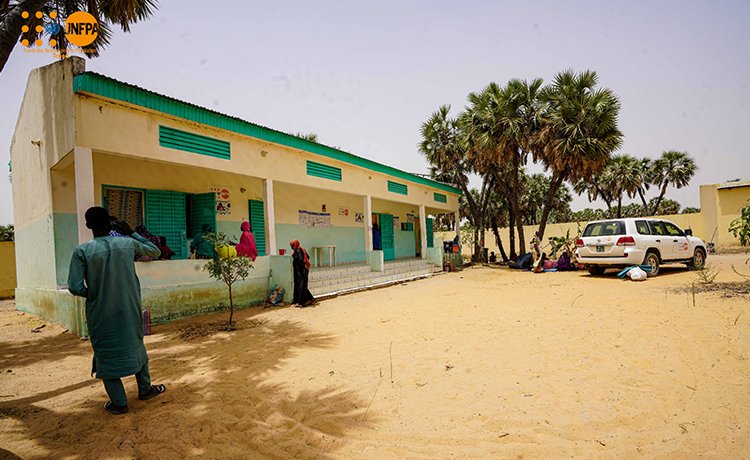News
On the front lines of climate-driven crisis: UNFPA-supported midwives prevent maternal deaths among Cameroonian refugees in Chad
- 02 May 2024
News
N'DJAMENA, Chad – “At the start of the crisis, the work was very complex. People came with fear and trauma,” midwife Neïma Patricia told UNFPA, the United Nations sexual and reproductive health agency.
Ms. Patricia works at the Kalambari refugee camp, which hosts more than 9,000 displaced people outside Chad’s capital N’Djamena, many from neighbouring Cameroon. Tens of thousands fled Cameroon in December 2021 after violence reignited in its northeast region over the use of resources – particularly water, which has become scarce amid drought in the Lake Chad basin.
Of the almost 36,000 Cameroonian refugees registered in Chad by January 2022, about 90 per cent were women and children. The arrival of thousands at the Kalambari camp, where Ms. Patricia has worked since 2021, has been accompanied by an urgent need for skilled and sensitive care: “We have handled [36] cases of premature births and [23 cases of] rape”, she told UNFPA.
Amid this humanitarian crisis, UNFPA has deployed 15 midwives across two refugee camps and four refugee reception sites to provide a range of sexual and reproductive health services, including those related to family planning, pregnancy and childbirth.
“When crisis strikes, midwives are often first on the scene. They know babies arrive no matter a childbearing woman’s circumstances – whether she’s resting at home or fleeing it due to conflict or disaster,” UNFPA Executive Director Dr. Natalia Kanem said in a statement commemorating the International Day of the Midwife.
“[They] are the unsung heroes of community health services.”
Changing family plans
Climate change and the displacement it drives can be devastating for women and girls, as both heighten risks of gender-based violence and can disrupt access to essential services, including for sexual and reproductive health.
Research suggests, for example, that unintended pregnancies rise in the aftermath of natural disasters, and are more common among refugees.
At the Kalambari refugee camp, midwives have helped women achieve the level of fertility they desire, even as they navigate the challenges of displacement.
“Life is already difficult. We have to fight daily for survival,” said 26-year-old Gabdaibe Thibothe, who visited the Kalambari maternity ward for family planning and contraceptives. “Thanks to the midwives’ awareness-raising, I understood that by spacing out the births of children, families can better provide for children’s needs in terms of education and health.”
“I practise family planning because it not only allows us to manage resources well, but it promotes more balanced and harmonious family development,” she added.

Preventing needless tragedies
The midwives at Kalambari have made a difference. Ms. Patricia said the women in the area used to give birth in quicker succession than they do now, and chalks the change up to the education efforts of her fellow health workers as well as the availability of contraceptives.
Over the month of March, she and her colleagues carried out 400 prenatal consultations and conducted 45 safe deliveries. “Directing women for adequate care and saving lives is something that makes me proud as a midwife,” Ms. Patricia told UNFPA.
Ms. Patricia’s co-worker, midwife Charité Nartewaye Moutedé, said there have been no maternal deaths at the camp since she began working there.
“This is a real reason for satisfaction,” Ms. Nartewaye said. “I feel a sense of pride in the work I do for maternal health.”